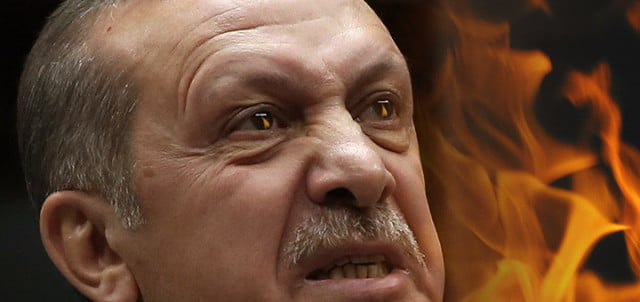South Africa is not a hunting ground for Erdogan

Date posted: May 20, 2017
Shannon Ebrahim
South Africans know what it means to be detained without trial and tortured. With that history in mind, the ANC-led government is not about to extradite a list of Turkish expats working in South Africa to Turkey, where their detention and torture is likely.
Not matter how many carrots President Recep Tayyip Erdogan lays out for President Jacob Zuma next month when he plans to visit South Africa, he is unlikely to get what he wants. Behind closed doors he is likely to present Zuma with a list of names of school principals, teachers, independent journalists, and business people who he alleges support the Gulen movement, and demand they be extradited to Turkey.
As a country with a deep respect for the rule of law, we cannot allow ourselves to become a hunting ground for foreign governments to exact revenge on those it considers its political opponents. On that there should be no prevarication and no price.
Amnesty International has extensively documented the arbitrary detention and torture of detainees from the Hizmet movement who are being held by the Turkish government. South Africans are aware of the abduction three weeks ago of three Turkish citizens working in Malaysia (one a school principal), who have now been extradited to Turkey and face torture and solitary confinement.
Our government is well aware of Erdogan’s pronouncements that “no country in the world will be safe for Gulen members they have no right to life”. It is not in Zuma or the ANC’s political culture to capitulate to these demands.
Erdogan blames Hizmet’s spiritual leader Fetullah Gulen for a failed coup in Turkey last year, but has failed to offer any proof to date of his allegations. The coup provided the pretext for dismissing more than 100 000 Hizmet followers from their jobs, and detaining without trial round 47 000. Erdogan’s AK (Justice and Development) party was close to the Hizmet movement until 2012, when it accused a number of government ministers of corruption.
Erdogan tried to use strong-arm tactics with a number of other African presidents over the past year, to force them to extradite members of the Hizmet movement, but he didn’t get very far. Not only do African leaders not appreciate being bullied, they also have loyalty to a movement which has established schools and educational centres across the continent, and has educated the children of many African leaders.
In every meeting with his African couterparts, Erdogan failed to provide any evidence that Hizmet school teachers or journalists could in any way be linked to terrorism. His numerous visits over the past year and a half have been touted as Turkey expanding its footprint on the continent, penetrating new markets and expanding investment. But the underlying condition was always there – close down Hizmet schools and extradite their staff.
Last year, Erdogan met the leaders of Ivory Coast, Ghana, Nigeria, Guinea, Kenya, Uganda and Somalia. The only country that met his demands to close Hizmet schools was war-ravaged Somalia, which has benefited immensely from massive Turkish aid and development projects.
Earlier this year, Erdogan met the presidents of Tanzania, Mozambique and Madagascar. A battery of carrots and sticks were employed to get these them to agree to Turkey’s list of demands against those it considers its political opponents. Erdogan visited Tanzania and promised President John Magufuli a massive loan for the construction of a 400km railway line in return for taking action against Hizmet schools and businesses. Capitulation was not forthcoming.
In Mozambique, Erdogan met President Felipe Nyusi, and demanded he take action against Hizmet movement supporters, making outlandish allegations that the school teachers could even try to topple the Mozambican government as he claims they did in Turkey.
One wonders when he made such accusations whether he even realised Nyusi’s son had been educated in the Willow School in Maputo, run by the Hizmet movement.
The Willow schools in Maputo and Matola have educated many of the children and grandchildren of the Mozambican leadership.
Needless to say, Erdogan left Mozambique frustrated with the government’s refusal to meet Turkey’s demands.
As for Madagascar, Erdogan had not better luck in his meeting with President Hery Rajaonarimampianina, who firmly refused to shut down its Hizmet schools. Not only have the schools been successful as they employ experienced teachers and have high academic results, but they have been popular among the middle classes across French-speaking Africa as an inexpensive alternative to French schools.
Guinea benefited immensely from the 20 Hizmet schools in its capital Conakry, as did Senegal with 11 educational institutions.
In South Africa, the pressure of the Turkish government on the Hizmet movement has been fierce. It has recently taken $4 billion (R52bn) in personal assets from the Turkish philanthropist based in South Africa known as “Uncle Ali”. Ali established the now famous Nizamiye mosque in Midrand with its clinic and school attached. The Hizmet movement has opened nine schools in South Africa since 1997, some of them proving to be among the best performing in country.
As a country with a deep respect for the rule of law, we cannot allow ourselves to become a hunting ground for foreign governments to exact revenge on those it considers its political opponents. On that there should be no prevarication and no price.
Source: Pretoria News , May 19, 2017
Tags: Africa | Education | Hizmet-inspired schools | Persecution of Hizmet by Erdogan | South Africa | Turkey |
























